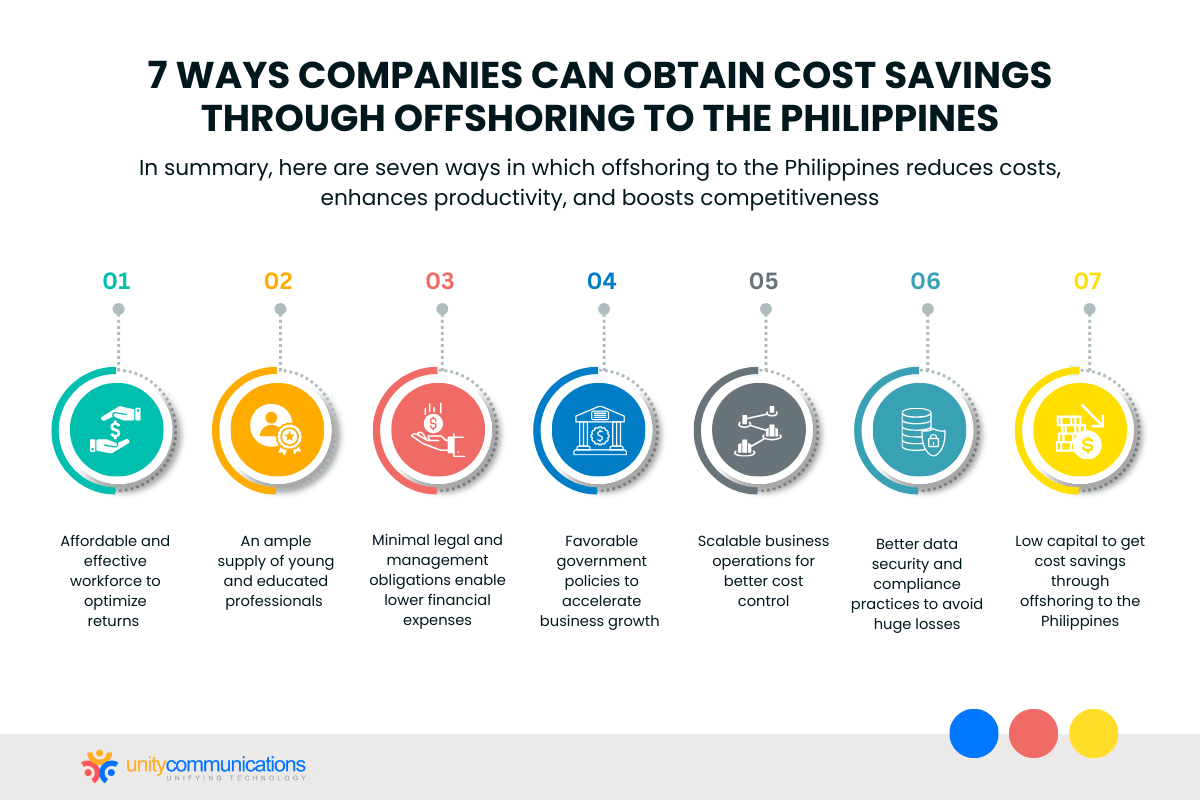IN THIS ARTICLE
Table of Contents
Many established companies use offshoring strategies to reduce business costs. They transfer their operations overseas to take advantage of affordability and efficiency.
Offshoring providers in the Philippines offer different outsourcing services to businesses and organizations worldwide. They handle back-office operations, such as customer service, help desk, and sales support, to help clients meet their goals and concentrate on core competencies.
This article discusses how companies can obtain cost savings through offshoring to the Philippines. It explains the benefits of outsourcing to the country and how these translate to lower business expenses and maximized profits.
Keep reading to learn more.
Affordable and Effective Workforce to Optimize Returns

Cost savings through offshoring to the Philippines can be achieved by capitalizing on salary cost differences. The country provides top-notch professionals at a fraction of the cost.
Filipinos’ hard (e.g., industry-specific certifications and computer systems knowledge) and soft skills (e.g., interpersonal and communication) and educational attainment are at the same level as workers in more developed countries. Their edge, however, is in their affordable salaries.
Lower wage costs, including salaries, employer contributions, and employee taxes, enable business process outsourcing (BPO) companies in the Philippines to provide first-rate outsourcing services at decreased operating expenses. Thus, they can charge lower service fees than their high-salary outsourcing rivals.
The country’s affordable living expenses are the main reason for its cost-effective salaries. A single Filipino worker can live adequately on a monthly wage of $300 to $600. The amount can pay for essentials, including rent, food, groceries, utilities, and transport fares. The individual typically shares expenses with an employed family member.
Salary Costs in the Philippines
The table below shows the average salaries for commonly outsourced roles. Let us use this data to estimate the cost savings you can get from offshoring to the Philippines:
| Position | Average Monthly Salary | Low | High |
|---|---|---|---|
| Customer service representative (CSR) | $554 | $215 | $1,201 |
| Accountant | $545 | $251 | $867 |
| Bookkeeper | $375 | $172 | $595 |
| Content writer | $668 | $308 | $1,062 |
| SEO associate | $606 | $279 | $963 |
| Digital marketing strategist | $1,048 | $481 | $1,666 |
| Front-end web Developer | $673 | $309 | $1,069 |
| Full-stack web developer | $747 | $344 | $1,187 |
| Graphic designer | $487 | $224 | $773 |
| Video editor | $568 | $261 | $903 |
| Telemarketer | $409 | $188 | $650 |
| Back-end web developer | $525 | $737 | $950 |
| Data encoder | $488 | $633 | $1,579 |
| Technical support specialist | $498 | $443 | $1,267 |
| Virtual Assistant | $498 | $285 | $724 |
Note: All these figures are from SalaryExplorer.com except for the back-end web developer, data encoder, technical support specialist, and virtual assistant roles, which are from Talent.com. Each salary is converted from Philippine pesos (PHP) to U.S. dollars for uniformity. The exchange rate was around PHP 55.27 to $1 as of May 4, 2023.
Based on the table above, the average salary for a CSR in the Philippines is about $554 per month or $6,648 annually. In the U.S., a CSR’s average annual salary is around $58,803, or about $4,900 monthly. The cost savings earned through offshoring to the Philippines are $52,155 ($58,803 minus $6,648) per headcount per year.
Note that the salary amount and calculation illustrations are approximations. Contact a BPO company to determine the exact costs and other details.
Ample Supply of Young and Educated Professionals for Outsourced Tasks
The country’s abundant labor supply enables businesses to achieve cost savings through offshoring to the Philippines.
According to the latest national government poll, nearly 75 million Filipinos can work. Of this working-age population, aged 15 to 64, about 48 million are in the workforce. The labor force participation rate is 63%, meaning six out of 10 employable Filipinos can work at any time.
The country’s educational institutions, including colleges, technical centers, vocational schools, and universities, regularly produce tens of thousands of graduates, mostly from the millennial and Generation Z groups. They total millions and display flexibility, passion, drive, and interest in working when job opportunities come.
These groups are familiar with the latest gadgets, trends, and technologies, such as mobile phones, communication applications, and social networks. These skills and attitudes enable them to perform outsourced tasks to help companies realize cost savings through offshoring to the Philippines.
Effects of Labor Shortages on Outsourcing
Cost savings through offshoring to the Philippines or any other outsourcing destination are hard to achieve during a labor shortage. For instance, when the customer service unit lacks manpower, wait or hold times increase, leading to lower consumer satisfaction and experience and higher work demands on employees.
Customer experience nowadays is a revenue driver. It contributes to the company’s bottom line by building, maintaining, and expanding buyer loyalty for repeat sales. Unhappy customers are likely to switch to different businesses. Such a scenario increases the company’s acquisition or marketing costs to attract new buyers.
The Great Attrition of 2021 is an example of a major labor shortage that disrupted businesses, leading to over 19 million American workers leaving their jobs. As labor shortages persist, companies must offer higher salaries to compete for qualified workers. Inflation is also likely to follow due to higher operating costs, raising business costs.
In such cases, U.S. companies can enjoy a continuous labor supply and cost savings by offshoring to the Philippines. With a steady supply of qualified talent, the country’s BPO companies will likely experience manageable operating costs, translating to reasonable service rates. Thus, outsourcing to the Philippines is a feasible long-term business strategy.
Minimal Legal and Management Obligations to Lower Financial Expenses

Diminished legal and management accountabilities allow businesses to attain cost savings through offshoring to the Philippines. Delegating operations to a Philippine BPO provider means a company no longer needs to set up its own branch to oversee them.
Establishing an office abroad involves monitoring and observing complicated labor policies, tax regulations, and compliance codes. These activities take time and effort but are critical to avoiding legal and financial consequences.
Outsourcing can protect businesses from potential administrative issues or legal backlash from direct employee hiring. The Philippines has specific labor laws permitting local workers to form unions for collective bargaining. Labor organizations can also initiate work stoppages.
Impact of Work Stoppages and Employee Lawsuits
A work stoppage happens when employees stop working as an expression of complaint or protest. If unionized employees organize it, it is called a “labor strike.” Management can also initiate a work stoppage at a unionized site, known as a “lockout.” This event’s damaging effects include the following:
- Lost sales resulting from customer flight, fear, or dissatisfaction
- Higher operating costs due to hiring temporary workers to continue operations
- Rattled shareholder or stockholder confidence, which might lower share or stock value
The affected company incurs substantial financial losses during an extended union strike, even when hiring replacement staff. Workers also experience lost wages and workflow gaps, affecting their productivity, financial stability, and livelihood.
Businesses can achieve cost savings through offshoring to the Philippines because outsourcing shields them from labor strikes, which the media typically covers.
Such public coverage might result in reputational damage, discouraging potential talent from working with the company. Restoring the company’s image and attracting better job applicants lead to higher public relations and recruitment costs.
Similarly, employee lawsuits are costly. Publicized business conflicts can sully the company’s name. Contract disagreements, complaints, or malpractice allegations can compel the organization to slow down or temporarily stop operations. Litigation can drop sales and increase legal costs. Working with a BPO in the Philippines is one way to avoid this high financial cost.
Favorable Government Policies to Accelerate Business Growth
Business-friendly laws have indirect positive effects on cost savings gained through offshoring to the Philippines. BPO companies prosper more when government regulations support the outsourcing industry. Past and current administrations acknowledge the sector’s significant contribution to job generation, technology and knowledge exchange, and tax revenue.
The national government promotes the BPO industry via the Philippine Economic Zone Authority (PEZA), an agency that provides tax incentives and assists businesses in registering their operations. Service providers must coordinate with PEZA and relocate to one of its economic zones or information technology (IT) parks to obtain the following tax benefits:
- Income tax holidays (ITH) provide a 100% exemption from corporate income tax for a maximum of eight years.
- Only a 5% special tax on gross income upon ITH expiration, as well as exemption from all national and local taxes
To date, PEZA has reported 416 economic zones nationwide. These zones serve nearly 4,700 companies involved in different businesses and services. Manufacturing and IT-BPO are the primary industries.
ITH’s Effect on Cost Savings Through Offshoring to the Philippines
PEZA’s ITH excludes service providers from corporate income tax (CIT), which is 25% of net income on all sources generated from local operations.
So if a BPO company records a net taxable income of $1 million in one year, it should pay the government $250,000 ($1 million x 25% CIT). But with ITH, the service provider keeps that amount and can post it on the balance sheet instead as retained earnings.
Taxes are considered business costs as the service provider experiences a cash outflow when settling its financial obligations to the government. Thus, the amount saved because of ITH lets BPO providers charge lower service fees due to their reduced operating costs.
Outsourcing can thus help businesses attain cost savings through offshoring to the Philippines.
Scalable Business Operations for Better Cost Control

Scalability lets companies adjust outsourced activities based on their current business needs. This ability enables a company to achieve cost savings through offshoring to the Philippines.
Having flexible functions for better cost management is why technical support and customer service outsourcing in the Philippines is an ideal strategy.
With scalability, the service provider can promptly adjust or modify the third-party team’s size and task volume without disrupting current operations. It helps businesses spend resources properly to operate effectively.
Consider the advantages of scalability:
- Agility. The BPO provider helps the company prepare for unexpected and challenging incidents so as not to interrupt back-office operations.
- Adaptability. Outsourced processes can quickly conform to changing business or customer requirements and conditions. Being adaptable enhances the company’s market competitiveness and responsiveness.
Getting Cost Savings Through Offshoring to the Philippines with Scalability
Outsourcing can assist businesses in obtaining cost savings through offshoring to the Philippines. They can handle operating expenses better by reducing fixed costs, such as employee salaries, paid leaves, insurance, retirement plans, recruitment, and training.
Outsourcing back-end processes to a service provider is considered a variable cost in accounting. Depending on production volume, expenses might exceed fixed costs. For instance, a company needs seven full-time staff members to run its in-house customer support team. Each staff member earns $4,000, totaling a monthly cost of $28,000.
With outsourcing, the company requires the same number of workers per month to address the increased demand for customer service during busy periods. Costs remain the same, but production is higher, which is favorable for the business.
When slow months come, the in-house customer support team will still cost the company $28,000 monthly. Salary costs are fixed expenses. The organization can lay off employees to decrease its financial burden.
In contrast, outsourcing costs during slow periods can also go down. The third-party provider can temporarily supply fewer agents to the company and charge lower fees. Scaling the team size down to only two specialists, for example, can save the company at least $20,000 monthly during a business slowdown.
Better Data Security and Compliance Practices to Avoid Huge Losses

A BPO company’s expertise in data security practices can allow a company to achieve cost savings through offshoring to the Philippines. The service provider can protect sensitive and critical digital information from illegal access and data loss.
Below are a few best practices the service provider follows to safeguard data against threats, ultimately helping clients save on costs:
- Train and educate third-party teams. The BPO provider ensures staff members fully understand and are constantly updated about data security. It reminds and warns them about the detrimental effects of information negligence and misuse. Workers are advised against sharing passwords, which are changed routinely.
- Upgrade and strengthen IT systems. The third-party provider updates its IT infrastructure with the latest security applications and software to protect itself from data breaches and possible online attacks. It removes software vulnerabilities, ensuring hackers cannot exploit any security gaps or weaknesses.
The BPO provider’s focus on data compliance can also enable a company to attain cost savings through offshoring to the Philippines. Complying with government regulations is its top priority to help businesses avoid fines and potential litigation due to violations.
The following are two compliance regulations that service providers must follow:
- The Payment Card Industry Data Security Standard (PCI-DSS) is a data security measure developed by credit card companies. It mandates that businesses of all sizes and types in any industry must access and use the details of credit card users securely and privately.
- The General Data Protection Regulation (GDPR) is known to be the world’s most stringent privacy law protecting customer data in the European Union (EU). Companies and organizations under GDPR must keep consumer, client, or user information secure and stored for up to six years.
Data Regulation Noncompliance Leads to Costly Fines
Cost savings through offshoring to the Philippines, or any outsourcing hub, are only possible when service providers can help company clients comply. Oversight, negligence, or disregard of government policies and industry standards can put businesses in serious legal and financial trouble.
In particular, GDPR violations have been on the rise since its implementation in 2018. EQS Group, a German-based software developer specializing in compliance, lists the biggest GDPR fines of 2022. Among them:
- Meta ($454 million or €405 million). The Irish Data Protection Commission slapped the amount on Meta-owned Instagram for violating children’s privacy by disclosing their email addresses and phone numbers, making them accessible to other users. The fine was the second-biggest after Amazon’s $836.3 million (€746 million) levy in 2021.
- Clearview AI Inc. ($22.4 million or €20 million). The Italian Privacy Regulator (Garante per la Protezione dei Dati Personali) levied a fine against U.S.-based facial recognition company Clearview AI for breaking various GDPR provisions. The company collects selfies online and stores them in its database to sell identity-matching services.
- Google ($11.2 million or €10 million). Agencia Española de Protección de Datos (AEDP), Spain’s data protection agency, imposed the biggest penalty on Google for illegally sharing personal data with an independent third-party research project called Lumen. The search engine provider passed EU citizen data to the project.
- Rewe ($8.9 million or €8 million). Österreichische Datenschutzbehörde, Austria’s data protection agency, penalized supermarket chain Rewe for violating its customer loyalty program. The company did not properly inform its customers about using their data.
With outsourcing, the service provider manages and monitors data use, security, and privacy activities, minimizing hefty fines for non-compliance. This feature allows businesses to optimize cost savings through offshoring to the Philippines.
Low Capital to Get Cost Savings Through Offshoring to the Philippines
Minimal capital expenditures let businesses realize cost savings through offshoring to the Philippines. Outsourcing means companies are no longer required to invest in new equipment, hardware and software, digital devices, office supplies, and workspaces. The service provider has all the facilities and equipment necessary to perform the delegated processes.
Experiencing low capital spending on non-core, back-office operations (e.g., customer service, technical support, data entry, and bookkeeping) frees up considerable funding for higher-value projects.
Below are the other cost-saving benefits of offshoring to the Philippines:
- Pay fewer workers. Building an in-house team means paying more for salaries and training. Hiring full-time employees does not guarantee they will stay longer. Workers might leave the company at any time. Additionally, the cost of recruiting and retaining regular staff is typically higher than what a company pays for the BPO firm’s services.
- Enjoy zero maintenance costs. Purchasing additional equipment and computer systems also entails maintaining and upgrading them over time. Hiring in-house IT professionals or consulting firms to manage and maintain the facilities might require extra funding.
Additionally, low investment in technology to support back-office operations allows organizations to gain cost savings through offshoring to the Philippines. For instance, a third-party provider offers pay-as-you-go (PAYG) pricing for its contact center solutions, such as video call services, messaging, and audio calls.
PAYG is the amount to settle for using a solution. It is comparable to the billing policies of water, electric, and other utility providers. The rate to pay depends on how much the business consumes per period. The company rents the technology instead of purchasing it.
The Bottom Line

Understanding the benefits of offshoring to the Philippines is fundamental to helping an organization secure cost savings through offshoring to the Philippines. Some likely outsourcing risks include shouldering extra expenses and disclosing private customer information to the partner.
Offshoring reduces costs and improves productivity and performance to raise revenue and competitiveness. Client companies get these benefits when they partner with a reputable, reliable, and established BPO company.
Let’s connect if you want to learn more about cost savings through offshoring to the Philippines!





